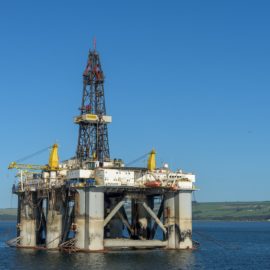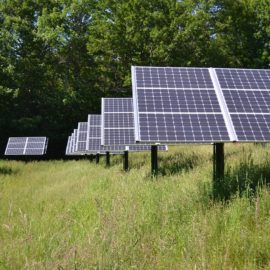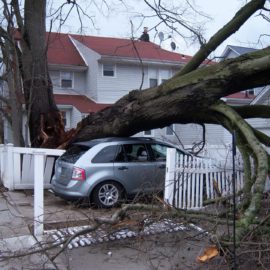
Late night vote and both Louisiana senators tried but failed to get hurricane relief for Lake Charles in the budget bill.
What may have been the Lake Charles area’s last chance to obtain more long-term hurricane recovery aid from the federal government has failed. A late-night vote Thursday in the U.S. Senate on a massive federal spending package includes no further hurricane relief for Louisiana. A desperate, 11th-hour bid by Sens. Bill Cassidy and John Kennedy to include $2.5 billion in disaster relief in the bill was rejected. For local officials in Lake Charles, the failure illustrates the capricious and overtly political nature of federal disaster aid. The congressman for southwest Louisiana, Rep. Clay Higgins, has also come under scrutiny for what some see as a lackluster effort to obtain aid for the hurricane-battered region. Members of the state’s congressional delegation meanwhile fault the White House for not making a specific request for further money in the hard-fought negotiations that led to the spending package. Pursuing disaster aid without such an endorsement is not impossible, but more difficult.
theadvocate.com
This was the last chance and it did not come about. As noted above the blame game has started.
The $1.5 trillion package to fund the government through September was seen as the last realistic chance for southwest Louisiana to obtain further long-term disaster relief. The region is still reeling from 2020’s Hurricane Laura, one of the strongest storms to ever make landfall in Louisiana, and Category 2 Hurricane Delta six weeks later. Cassidy pledged to continue his efforts, but 2020 disasters will fade further from view and the nation’s list of priorities as time passes. Recovery in southwest Louisiana has been complicated by a harsh winter storm in February 2021, severe flooding in May and the pandemic, which boosted rebuilding costs and limited volunteers. Housing remains a major issue in the Lake Charles area, and it is unclear how many people have given up and left for good. “If you fly over southwest Louisiana, you see blue tarps,” Cassidy said on the Senate floor as he and Kennedy proposed their amendment. “Those tarps are there because the families have not had the money to replace their roofs. If you get on the ground, you see blighted neighborhoods.” Kennedy added: “In 2020, Hurricane Laura hit Louisiana, then Hurricane Marco hit us, then Hurricane Delta hit us, then Hurricane Zeta, then Hurricane Ida – all in a period of two years. Those storms caused $150 billion in damage.”
This is a case of one state needing more than others. The congressional delegation, at least a few of them, tried and tried hard.
The state’s delegation was also seeking aid related to Hurricane Ida, which devastated parts of southeast Louisiana in August. Time likely remains to appropriate further funds for recovery from that storm, particularly given the range of states affected, including New York. When the spending package was presented to the House on Wednesday, Rep. Garret Graves, R-Baton Rouge, sought to include $3 billion in disaster relief, but that proposal was also rejected. He questioned why the government was sending aid abroad without taking care of needs at home. “You’re treating people of other countries better than we’re treating our own,” he said. “I want to be clear: I’m not necessarily saying that with Ukraine. We’re not under missile attack right now. But for some of these other countries, that’s exactly what’s happening.”
Maybe working to our disadvantage is all the money in the past that has come to us.
Hundreds of millions have been spent in southwest Louisiana on immediate needs following the storms, much of it through FEMA. But long-term aid usually follows in the form of Community Development Block Grants to address housing, economic and infrastructure damage. Congress did not approve a first appropriation of long-term aid for southwest Louisiana until late September, more than a year after Laura. It approved an initial package of aid related to Ida at the same time, though that storm hit a year later. The aid approved for southwest Louisiana amounted to just $600 million, which state and local officials say is far short of what is needed. Gov. John Bel Edwards had pushed for $300 million more to address housing and another $100 million for businesses. The initial $600 million remains tied up in bureaucratic steps and is yet to be distributed.
The Lake Charles mayor is not happy and says he only wants to be treated equally to other cities that ate hit by storms.
Lake Charles Mayor Nic Hunter has repeatedly criticized the aid process and questioned why his city should be treated differently from others hit by natural disasters. Local officials have highlighted the region’s role as an energy hub as well as its housing damage and limited resources to address infrastructure. “Since day one after Hurricane Laura, this community has received hollow promises and empty gestures from members of both major political parties,” he said in a statement on Wednesday, when the bill was presented before the House. “I wish I could say this latest news was a surprise to me. The process for supplemental disaster aid is extremely political and it seems as if our political clout here in southwest Louisiana was not sufficient enough to warrant the type of equitable response that other communities have received in the past.” Calcasieu Parish Police Jury President Tony Stelly expressed similar concerns. “Simply put, the continued failure to appropriate adequate aid for the disasters that devastated southwest Louisiana over a year and a half ago is hard to believe,” he said in a statement. “Recovery is ongoing, but it has been unnecessarily arduous due to lack of appropriate disaster aid.”
Representative Higgins has been chastised for some of his actions.
Higgins voted against the spending package in part because it did not include further disaster aid, which he called “unacceptable.” The congressman, a fervent Donald Trump supporter, skipped President Biden’s visit to Lake Charles in May and some have called on him to put aside partisan warfare to better help his district. His office defends his efforts in advocating for aid and pressuring FEMA to speed up reimbursements. Louisiana’s congressional delegation has also raised concerns over an expired data-sharing agreement between FEMA and the U.S. Department of Housing and Urban Development that they say is helping hold up the distribution of some disaster funds. The delegation spelled out those concerns in a letter to Biden on Thursday.
This may close the books on Lake Charles, that is until another hurricane hits.



